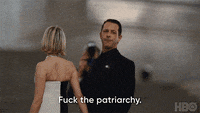Loving Succession is probably the closest I’ll come to loving British royal family drama. Outside of my erstwhile love for Kate Middleton’s sharp coat dresses circa 2011, I’ve always found the existence of a monarchy a bit puzzling, and the American fascination with the British monarchy in particular very puzzling. I never got the ‘90s fuss about Princes William or Harry. I remember exactly where I was when they announced Princess Di’s death, but I also remember realizing that day that I had never heard her voice. A big part of this is being a Nigerian in my 30s, and therefore having family members who experienced British rule before Nigerian independence. A petty part of this is having a British-Nigerian mother who is an avowed monarchist, and really annoying about it.
But the Harry and Meghan saga has been damn near unavoidable. Watching these two struggle within and now against a centuries-old institution captivates me in a way nothing about any royals has before. And Harry’s current publicity tour promoting his memoir Spare (fuck me wow, that title) is what made me realize that I’ve seen something like this before, in season three of Succession.
Spoilers for Succession follow. You’ve been warned.
Succession is the story that Is Not Inspired By the Murdoch family or the Redstone family, but is merely a fictional account of a media conglomerate-owning family and the cycles of abuse they perpetuate on each other and everyone they come into contact with. The Roy family is headed by toxic patriarch Logan, whose mission in life is to be the biggest bully in any room. His four children—Connor, Kendall, Shiv, and Roman—have spent the past three seasons jockeying for their father’s favour, and generally struggling with the fact that their massive privilege is chained to the massive emotional and physical abuse both of their parents heap onto them, even in adulthood.
Kendall is the child who struggles the most obviously, shifting from sabotaging his own efforts to fight or free himself from his father, to letting himself be mercilessly kicked around by his father. Season two ends with Kendall finally, thrillingly deciding in a press conference that "this is the day [Logan's] reign ends.” And it seemed like Kendall had all the ammo he needed—intimate knowledge of his father’s involvement in an abusive work environment that allowed for rampant sexual harassment and sometimes death. This was a moral fight, and we were excited.
But in season three, Kendall flops. He tries to bring his siblings on board with his insurrection, but his siblings are still too afraid of their father, and of what their lives could be if they turned against him. When they refuse him, he switches from a righteous pep talk to a self-righteous harangue, driving them further away. It also becomes clear that even though Kendall is dressing his grievances up in a morality costume, they are at the end of the day just personal grievances. He doesn’t want to dismantle his family’s company; he wants to run it, as he was promised. If Logan were to apologize for anything he did to Kendall, Kendall would likely drop the whole case.
Which brings me back to Harry.
Harry and Kendall both present to me as adult children who have recently gotten out of an abusive family environment and have only just started to process what they’ve experienced. They are hurt, and have identified at least part of what hurt them. And they cannot stop talking about it. They have the zeal of the converted: like Kendall, Harry sees his new worldview—the institution of the royal family is abusive—as the only righteous worldview. Like Kendall, the awakening didn’t happen because of anything more righteous than having his own expectations thwarted one too many times. (In Harry’s case, he expected his wife would be treated by his family and the press the way his brother’s wife was. He never considered her race and her Americanness as the threats to his family structure that they were, because he had never had to really think about race or colonization before.) Like Kendall, he is raging against his sibling who refuses to adopt his new worldview. And like Kendall, one suspects that if his dad acknowledged and apologized to him, he would drop his sermonizing and come back into the fold.
Harry and Meghan simply cannot actively try to dismantle the British monarchy, and that was never their goal. They wanted the British monarchy to be safe for Meghan. Which is admirable in its own way—it’s more than William and Kate wanted—but is not the sociopolitical cause their departure from the family initially made it seem. The more Harry and Meghan tell of their story, the smaller scale their ambitions appear, and the less sympathetic they become. Which is unfortunate for them because they don’t have much to offer the world right now besides their story.
Harry will be fine. His privilege almost guarantees it, and his family pretty much demands it. But I’m hoping for one “fuck the patriarchy” moment before this saga winds down.




